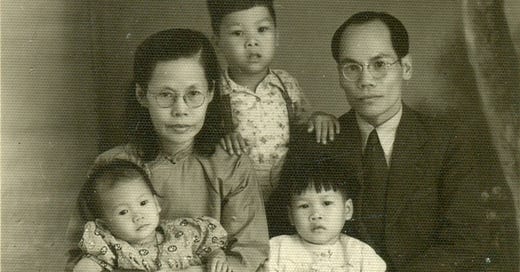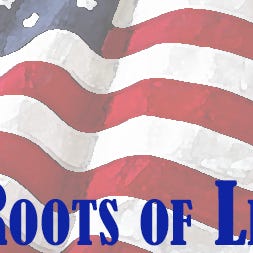A Wise Man Once Said Nothing
EDITOR'S NOTE: Today's guest post was prompted by Don't You Dare Succeed!, originally published at The Roots of Liberty April 2019 and recently shared here on Substack. Mr. Wright relates some of what he has learned from an on-going deep-dive effort into building a familial genealogy, and some political lessons for today.
In one of those odd moments when you realize that not many people actually know history, I was surprised to discover, through a back-door way, that the rather negative history of official US discrimination against people of Chinese ancestry was largely unknown. This arose in the context of Harvard University's ongoing official discrimination against students of Asian descent.
Harvard has found more and more back-door ways of making its student body less Asian, despite the superior reviews and test scores Asian candidates attain, on average, over other ethnic groups. The latest kerfuffle involves the statement by Professor Andrew Card, in the context of an ongoing anti-discrimination court case. And many seem entirely unaware that Harvard is continuing a long history of severe discrimination, one that began in 1882.
It so happens that my wife comes from a family directly impacted by the so-called Chinese Exclusion Act, passed that year, and signed into law by president Chester A. Arthur. The Act prohibited immigration by persons born in China unless they could demonstrate that they were merchants. The Act persisted until 1943, when it was revoked and replaced with a quota system that allowed only 115 individuals entrance into the US from China per year. It wasn't until 1965 that Chinese immigration was again permitted.
However, in studying my wife's family, I came to realize that sometimes government just cannot get it right, and it is absolutely possible for a clever person to not only game the system, but profit from it, especially where draconian laws such as the Act and its successors are in play. I believe this has lessons for the current era, because in fact the same kind of overly restrictive immigration laws lead to widespread gaming of the system - it the current situation, the asylum system. The fact that this is taking place apparently at the express wish of the current administration only means that more people will do it, expecting to succeed. It has already become the de facto means of immigration - more than 95% of new immigrants to the US are using it.
The Chinese immigrants between 1882 and 1943 were able to game the system several ways. A favorite one was claiming that you were born in the United States. Word got out that a warehouse fire in San Diego had destroyed birth records there, so all you had to do if you were the right age is claim you were born in San Diego to Chinese parents, who were in the US before the Act passed. If you managed to convince your questioners of that, you then could profit, by creating "paper sons" out of thin air. The way it worked is that you would go back to China, and return to the US with several males that were not your sons but claim they were. If the story sounded plausible, they were in. Of course, you had to be very careful not to step on your own stories from previous entrances, because the interviewers had access to your records and they would generally pick up on a problem. One of my wife's grandfathers brought seven paper sons into the US through this means; he in fact had only two sons for real, and one was killed in China before he ever attempted to go to the US. His two daughters went to Burma and Hong Kong, respectively, to escape the Communists, and he used their names as well for some paper sons; it wasn't until after 1965 that they came to the US. I don't know what he was compensated for this subterfuge, but I imagine it was a sizable amount for people trying to get out of China in the 1920s, 1930's, and 1940's. He also had to endure being locked in jail for a couple of months in 1902, when he made the mistake of crossing into the US from Canada illegally. This did not deter him; he entered numerous times legally until 1947, when he returned to China and later died there.
Not every immigrant pulled it off so well. My wife's other grandfather also brought a paper son into the US, but this almost proved to be his undoing. He did not know about the San Diego fire and tried to get in on the merchant loophole. He claimed his brother had a business in the US (this was true), but the interviewers did not believe him. He had to arrange testimony from an import/export business in Boston to make it work, and then they didn't believe that the paper son was really his - and for good reason, the ages just didn't work out. In the end the paper son did get in and so did my wife's grandfather, but it was such a difficult experience that this grandfather never attempted that again.
The lessons here are worth revisiting: First, it's simply not possible, or reasonable, to prevent the flow of people into or out of a country. Second, the more difficult it is, the more profitable, and whole industries are created to dodge such laws. Finally, immigrants of yore came to the US for the economic opportunities - and these are exactly the kind of people the US could use more of. It would be great if presence could be distinguished from citizenship.
Harvard, by overtly discriminating against Asians, is harming itself far more than it's harming those potential students. They will do well wherever they go. But Harvard is proving that it has lost all sense of why it's attractive, and may wind up whittling down its endowment until it is no longer a force in American secondary education. As for the lack of knowledge of history on Harvard's part, it doesn't surprise but it does sadden. Everything is in the service to a narrative these days, and the narrative is focused almost exclusively on groups who are exalted in their victimhood by the media. It has become impossible to even tap on the brakes on this runaway train. Asian Americans, even though they've been the victim of long-standing and brutal discrimination, are ignored - one suspects - because they are successful despite all that. And, perhaps, they as a group prefer to do things quietly and not ruffle feathers. As the old Chinese proverb goes, "A wise man once said nothing."






